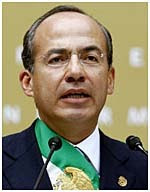 The President Felipe Calderon intends to revise the way state oil company Petroleos Mexicanos (Pemex) sells petrochemical feedstock, potentially opening the door to a $1bn (€680m) ethylene plant, he announced on Tuesday.
The President Felipe Calderon intends to revise the way state oil company Petroleos Mexicanos (Pemex) sells petrochemical feedstock, potentially opening the door to a $1bn (€680m) ethylene plant, he announced on Tuesday.“We are talking about the relaunch of the nation’s petrochemical industry," Calderon said in Spanish in a nationwide broadcast statement. “This will allow the development of a plant that will produce 1m tonnes/year of ethylene.”
In a second phase, some $700m would be invested downstream, he said.
Calderon said the plan is to “create a mechanism which, via a licensing process, will bring closer a market price or one that is really determines long term supply prices.”
State-run Pemex is the country's largest tax contributor, and its profits are tightly controlled for federal budgetary reasons. The policy has been a long-standing complaint of petrochemical producers.
From 2000-2006 the Vicente Fox administration also tried to encourage a massive expansion the nation’s ethylene production capacity. That scheme, dubbed Project Phoenix, ran aground on refusal by the Finance Ministry to allow Petroleos Mexicanos to charge differentiated rates for feedstock.
However, in 2007 the legislature overhauled Mexico's tax structure with an eye toward lowering energy costs for industrial consumers, including the petrochemical industry. The Mexican Senate followed this move by drawing plans to revive Mexico's petrochemical sector.
“The investment in this ethylene plant, which will be undertaken by the private sector, is $1bn for the plant and another $700m more in derivatives,” said Calderon.
The structure announced by Calderon bears some similarity to a plan described as under discussion by Jose Luis Zepada Pena, president of Mexican chemical industry body ANIQ in October. ANIQ proposed linking natural gas prices to the petrochemical market cycle.
“When margins are good the government could charge a premium, when the market is bad the government would charge less. Sharing the wealth when times are good and the risk when times are bad," he said.
Source: ICI News| By Alex Manda
No comments:
Post a Comment